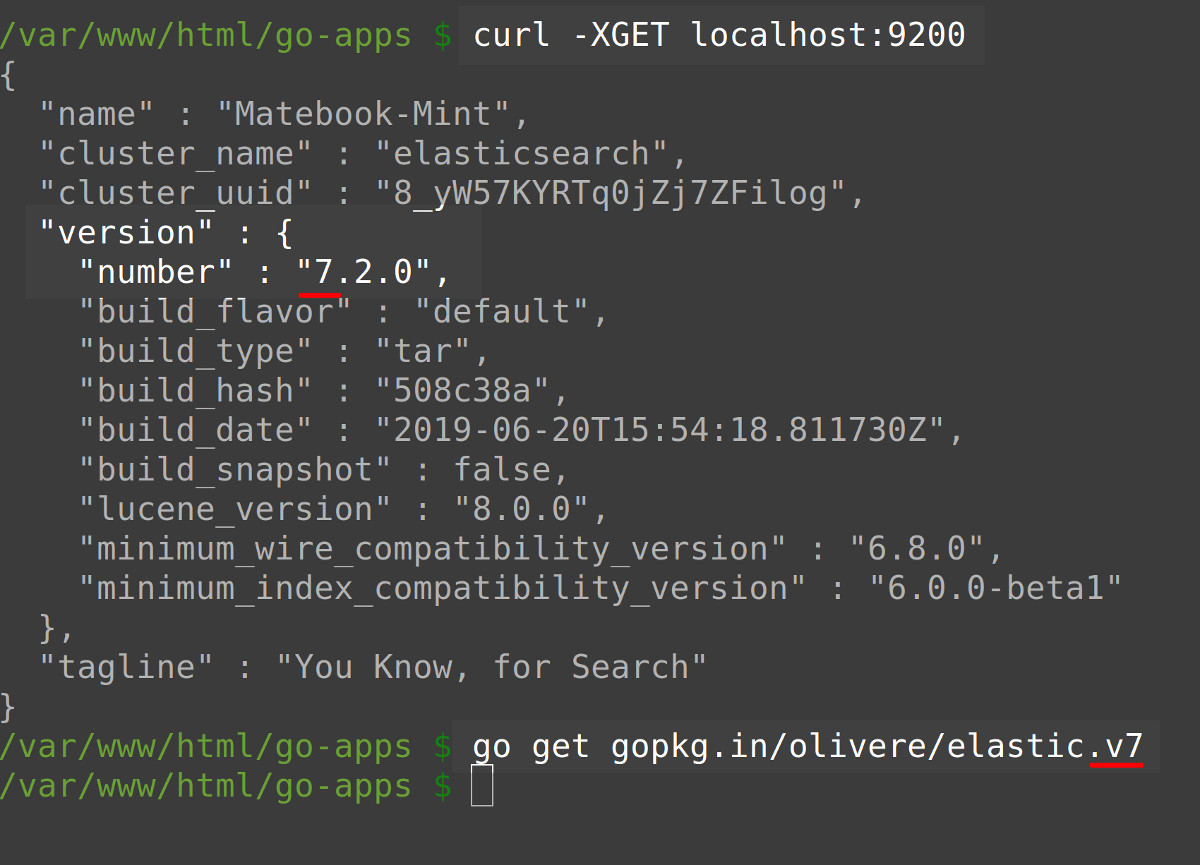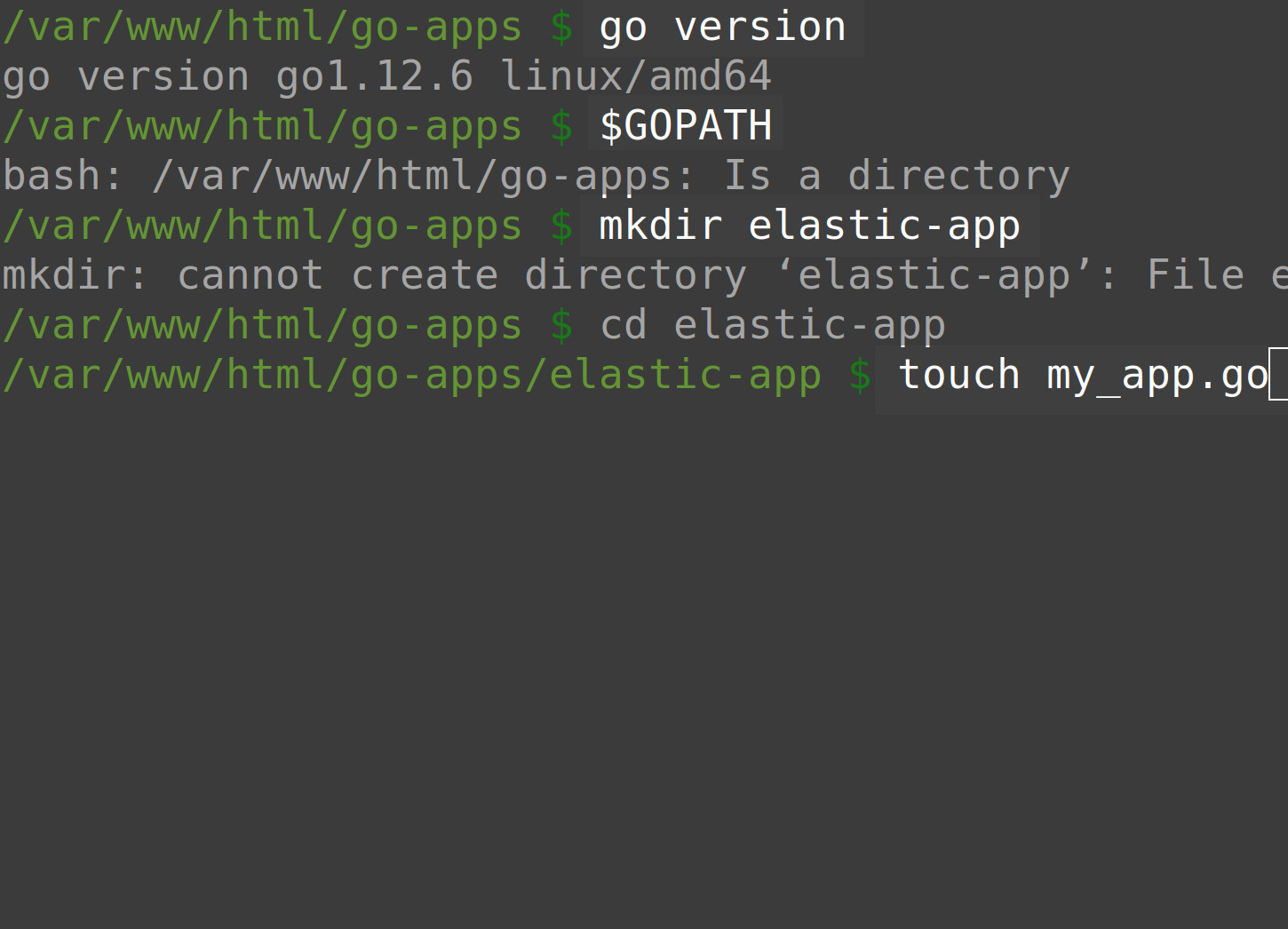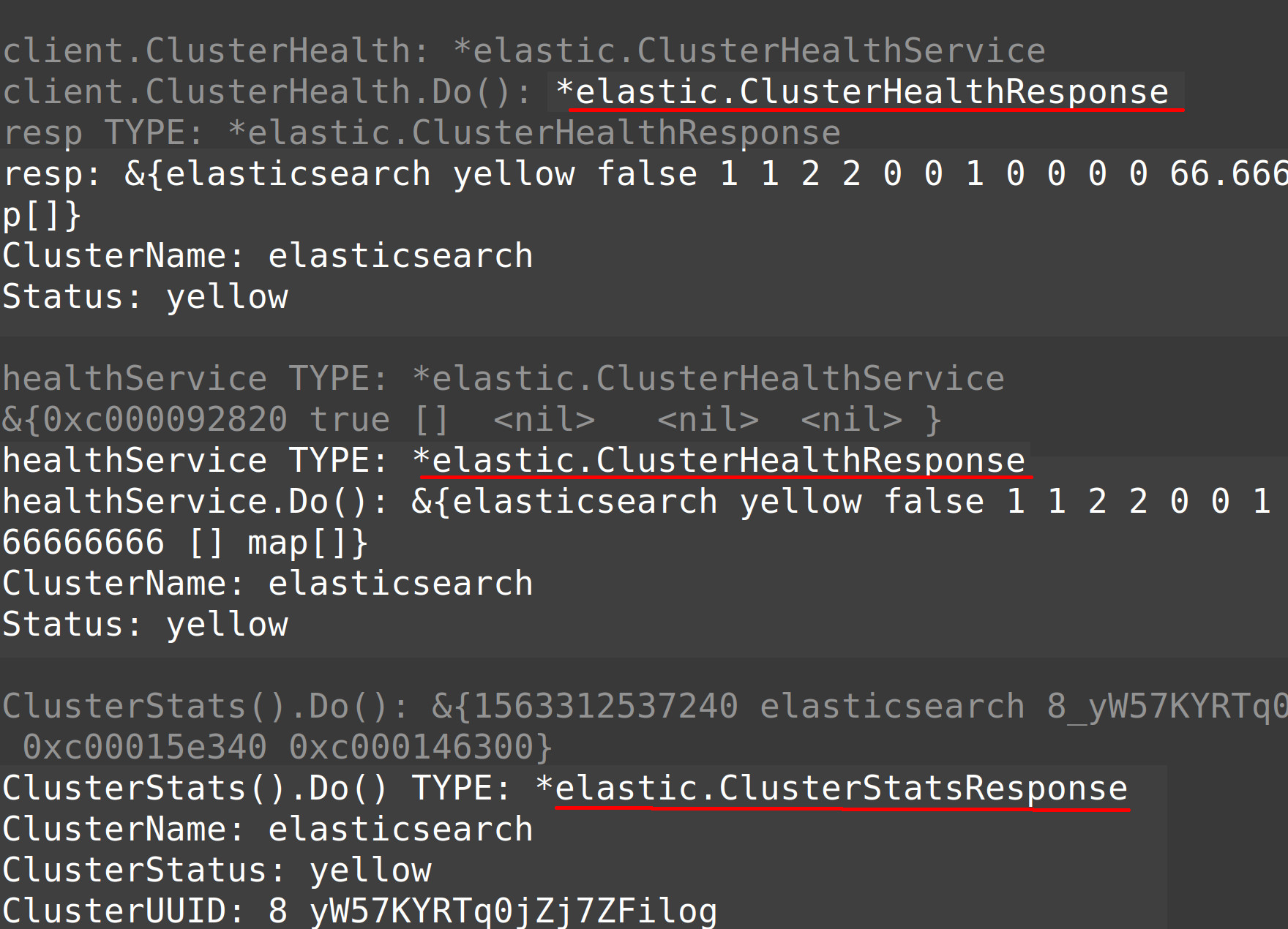How To Get An Elasticsearch Cluster's Health And Stats In Golang
Introduction
This tutorial will cover how to use the Olivere driver to obtain an Elasticsearch cluster health stats with Golang. A widely utilized third-party driver, the Olivere driver supports multiple versions of Elasticsearch. The default port for Elasticsearch is 9200, however, this can be configured in the cluster’s elasticsearch.yml file if and as needed.
Prerequisites
An Elasticsearch cluster needs to be running on the server.
The Golang program must be installed on the same machine running the Elasticsearch cluster. Make sure to export the
$GOROOTand$GOPATHpaths after installation. Typego versioninto a terminal window to confirm installation and obtain the installed Golang version.The Olivere Go driver for Elasticsearch must be installed on the same machine running Golang and the Elasticsearch cluster.
Have
sudoaccess to the Linux server or macOS system.
Note: A private key with sudo access is required to remotely access the server through SSH.
How to Install the Olivere Golang Package Driver for Elasticsearch
The following command will install the package for Elasticsearch 7.x:
1 | go get gopkg.in/olivere/elastic.v7 |
For older versions of the package driver, change the 7 at the end of the get command to match the major version number of the current Elasticsearch cluster. If needed, the following cURL request will obtain the cluster’s version number:
1 | curl -XGET localhost:9200 |

How to Create a Project Directory and Go Script in the Server’s GOPATH
NOTE: This step can be omitted if an Elasticsearch Golang project is already set up.
Navigate to your server’s $GOPATH (cd $GOPATH) and create a sub-directory somewhere in that path for the Elasticsearch application. Execute a cd into that project directory and create a Go script with the .go file extension as shown here:

How to Declare a Main() and Import the Elastic Driver’s Packages
Execute the following commands to declare a package the main() at the top of the script and import the necessary packages that will enable Golang to connect to Elasticsearch and make API calls:
1 2 3 4 5 6 7 8 9 10 11 12 | package main import ( "context" // Context object for Do() methods "fmt" // Format and print cluster data "log" // Log errors and quit "reflect" // Get object methods and attributes "time" // Set a timeout for the connection // Import the Olivere Golang driver for Elasticsearch "github.com/olivere/elastic" ) |
How to Connect to Elasticsearch with the Olivere Driver
Execute the following script to declare the main() function and create a new client instance of the elastic library:
1 2 3 4 5 6 7 8 9 10 11 12 13 14 15 | func main() { // Instantiate a client instance of the elastic library client, err := elastic.NewClient( elastic.SetSniff(true), elastic.SetURL("http://localhost:9200"), elastic.SetHealthcheckInterval(5*time.Second), // quit trying after 5 seconds ) // Declare Context object for API calls ctx := context.Background() // Print client information fmt.Println("client:", client) fmt.Println("client TYPE:", reflect.TypeOf(client)) |
How to log any connection errors returned from the Elasticsearch cluster
Execute the following commands to log any connection errors:
1 2 3 4 5 | // Check and see if olivere's NewClient() method returned an error if err != nil { fmt.Println("elastic.NewClient() ERROR: %v", err) log.Fatalf("quiting connection..") } |
Having Elasticsearch Return Cluster Stats Information with Golang
The Client library has a ClusterStats() library that can return vital information on the Elasticsearch cluster running on the server.
How to instantiate a ClusterStatsService object
Execute the following command:
1 2 | // Get elastic.ClusterStatsService stats := client.ClusterStats() |
How to get a Golang map[] response of the Elasticsearch cluster stats
Pass the ctx context object instantiated earlier to the ClusterStatsService object’s Do() method and have it return a ClusterStatsResponse using the following script:
1 2 3 | // Use the Do() method to return a *elastic.ClusterStatsResponse map[] statsDo, statErr := stats.Do(ctx) fmt.Println("nstats.Do(ctx) TYPE:", reflect.TypeOf(stat)) |
How to print attributes of the ClusterStatsResponse
Execute the following command:
1 2 3 4 5 6 7 8 9 10 11 | // Check for cluster stat's errors if statErr != nil { fmt.Println("nstatErr: %v", statErr) } else { // Print some attributes of the ClusterStatsResponse fmt.Println("nClusterStats().Do():", statsDo) fmt.Println("ClusterStats().Do() TYPE:", reflect.TypeOf(statsDo)) fmt.Println("ClusterName:", statsDo.ClusterName) fmt.Println("ClusterStatus:", statsDo.Status) fmt.Println("ClusterUUID:", statsDo.ClusterUUID) } |
The following script are the complete struct framework fields for the stats response:
1 |
// ClusterStatsResponse is the response of ClusterStatsService.Do.
type ClusterStatsResponse struct {
Timestamp int64 json:"timestamp"
ClusterName string json:"cluster_name"
ClusterUUID string json:"cluster_uuid"
Status string json:"status,omitempty" // e.g. green
Indices ClusterStatsIndices json:"indices"
Nodes ClusterStatsNodes json:"nodes"
}
`
How to Return the Elasticsearch Cluster Health Stats Golang with the Olivere Driver
How to use the ClusterHealth library to get an Elasticsearch cluster’s health
Execute the following code to create an instance of the client’s ClusterHealth() method library:
1 2 | // Print the cluster health for the client health := client.ClusterHealth() |
How to use the driver’s ClusterHealthService to get a response from Elasticsearch
Call the *elastic.ClusterHealthService object’s Do() method to have it make an API call to Elasticsearch. This will return a mapped struct response containing information about the cluster’s health. Execute this function with the following commands:
1 2 3 4 5 6 | // Use the Do() method to return a ClusterHealthResponse resp, err := health.Do(ctx) if err != nil { fmt.Println("ClusterHealth.Do() ERROR: %v", err) } else { ... |
How to print attributes of the ClusterHealthResponse object
If no errors are found, execute the following script to obtaining the cluster’s health information by accessing attributes of the response object:
1 2 3 4 5 6 7 8 | fmt.Println("nclient.ClusterHealth:", reflect.TypeOf(health)) fmt.Println("client.ClusterHealth.Do():", reflect.TypeOf(resp)) fmt.Println("resp TYPE:", reflect.TypeOf(resp)) fmt.Println("resp:", resp) fmt.Println("ClusterName:", resp.ClusterName) fmt.Println("Status:", resp.Status) } |
Here are all of the attributes for the ClusterHealthResponse struct framework:
1 2 3 4 5 6 7 8 9 10 11 12 | type ClusterHealthResponse struct { ClusterName string `json:"cluster_name"` Status string `json:"status"` TimedOut bool `json:"timed_out"` NumberOfNodes int `json:"number_of_nodes"` NumberOfDataNodes int `json:"number_of_data_nodes"` ActivePrimaryShards int `json:"active_primary_shards"` ActiveShards int `json:"active_shards"` RelocatingShards int `json:"relocating_shards"` InitializedShards int `json:"initialized_shards"` UnassignedShards int `json:"unassigned_shards"` } |
Conclusion
This tutorial covered how to use the Olivere Golang driver to make API calls to the server’s Elasticsearch cluster to obtain cluster stats and health information, shown in the following image:

Specifically, the tutorial explained how to install the Olivere Golang package driver, create a project directory and Go script, import the Elastic driver’s packages, connect to Elasticsearch with the Olivere driver, how to have Elasticsearch return cluster stats information and how to print attributes. Remember that the Elasticsearch cluster, the Golang program and the Olivere driver must all be installed on the same machine.
Just the Code
1 2 3 4 5 6 7 8 9 10 11 12 13 14 15 16 17 18 19 20 21 22 23 24 25 26 27 28 29 30 31 32 33 34 35 36 37 38 39 40 41 42 43 44 45 46 47 48 49 50 51 52 53 54 55 56 57 58 59 60 61 62 63 64 65 66 67 68 69 70 71 72 73 74 75 76 77 78 79 80 81 82 83 84 85 86 87 88 89 90 91 92 93 94 95 96 97 98 99 100 101 102 103 104 105 106 107 108 109 110 111 112 113 114 115 116 117 118 | package main import ( "context" // Context object for Do() methods "fmt" // Format and print cluster data "log" // Log errors and quit "reflect" // Get object methods and attributes "time" // Set a timeout for the connection // Import the Olivere Golang driver for Elasticsearch "github.com/olivere/elastic" ) func main() { // Instantiate a client instance of the elastic library client, err := elastic.NewClient( elastic.SetSniff(true), elastic.SetURL("http://localhost:9200"), elastic.SetHealthcheckInterval(5*time.Second), // quit trying after 5 seconds ) // Declare Context object for API calls ctx := context.Background() // Print client information fmt.Println("client:", client) fmt.Println("client TYPE:", reflect.TypeOf(client)) // Check and see if olivere's NewClient() method returned an error if err != nil { fmt.Println("elastic.NewClient() ERROR: %v", err) log.Fatalf("quiting connection..") } /* Get the cluster stats using the driver's ClusterStatsService */ // Get elastic.ClusterStatsService stats := client.ClusterStats() // Use the Do() method to return a *elastic.ClusterStatsResponse map[] statsDo, statErr := stats.Do(ctx) fmt.Println("nstats.Do(ctx) TYPE:", reflect.TypeOf(statsDo)) // Get the attributes for the cluster stats object t := reflect.TypeOf(stats) for i := 0; i < t.NumMethod(); i++ { method := t.Method(i) fmt.Println("nelastic.ClusterStatsService NAME:", i, method.Name) fmt.Println("method:", i, method) } print("nn") /* Get health stats using the driver's ClusterHealthService */ // Print the cluster health for the client health := client.ClusterHealth() // Get the attributes of the ClusterHealth() method t = reflect.TypeOf(health) fmt.Println("health:", reflect.TypeOf(health)) for i := 0; i < t.NumMethod(); i++ { method := t.Method(i) fmt.Println("nclient.ClusterHealth NAME:", i, method.Name) fmt.Println("method:", method) } // Use the Do() method to return a ClusterHealthResponse resp, err := health.Do(ctx) if err != nil { fmt.Println("ClusterHealth.Do() ERROR: %v", err) } else { fmt.Println("nclient.ClusterHealth:", reflect.TypeOf(health)) fmt.Println("client.ClusterHealth.Do():", reflect.TypeOf(resp)) fmt.Println("resp TYPE:", reflect.TypeOf(resp)) fmt.Println("resp:", resp) fmt.Println("ClusterName:", resp.ClusterName) fmt.Println("Status:", resp.Status) } /* Get health stats using the driver's NewClusterHealthService */ // Declare a elastic.ClusterHealthService object healthService := elastic.NewClusterHealthService(client) fmt.Println("nhealthService TYPE:", reflect.TypeOf(healthService)) fmt.Println(healthService.Pretty(true)) // Call Do() to return a elastic.ClusterHealthResponse serv, err := healthService.Do(ctx) // Check for health service errors if err != nil { fmt.Println("healthService.Do() ERROR: %v", err) } else { fmt.Println("healthService TYPE:", reflect.TypeOf(serv)) fmt.Println("healthService.Do():", serv) fmt.Println("ClusterName:", serv.ClusterName) fmt.Println("Status:", serv.Status) } // Check for cluster stat's errors if statErr != nil { fmt.Println("nstatErr: %v", statErr) } else { // Print some attributes of the ClusterStatsResponse fmt.Println("nClusterStats().Do():", statsDo) fmt.Println("ClusterStats().Do() TYPE:", reflect.TypeOf(statsDo)) fmt.Println("ClusterName:", statsDo.ClusterName) fmt.Println("ClusterStatus:", statsDo.Status) fmt.Println("ClusterUUID:", statsDo.ClusterUUID) } } |
Pilot the ObjectRocket Platform Free!
Try Fully-Managed CockroachDB, Elasticsearch, MongoDB, PostgreSQL (Beta) or Redis.
Get Started


